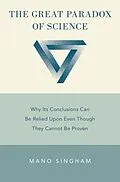Science has revolutionized our lives and continues to show inexorable progress today. It may seem obvious that this must be because its theories are steadily getting better and approaching the truth about the world. After all, what could science be progressing toward, if not the truth? But scholarship in the history, philosophy, and sociology of science offers little support for such a sanguine view. Those opposed to specific conclusions of the scientific community-nonbelievers in vaccinations, climate change, and evolution, for example-have been able to use a superficial understanding of the nature of science to sow doubt about the scientific consensus in those areas, leaving the general public confused as to whom to trust, with damaging effects for the health of individuals and the planet. The Great Paradox of Science argues that to better counter such anti-science efforts requires us to understand the nature of scientific knowledge at a much deeper level and dispel many myths and misconceptions. It is the use of scientific logic, the characteristics of which are elaborated on in the book, that enables the scientific community to arrive at reliable consensus judgments in which the public can retain a high degree of confidence. This scientific logic is applicable not just in science but can be used in all areas of life. Scientists, policymakers, and members of the general public will not only better understand why science works: They will also acquire the tools they need to make sound, rational decisions in all areas of their lives.
Autorentext
Mano Singham is retired Director of the University Center for Innovation in Teaching and Education (UCITE ), Adjunct Associate Professor of Physics at Case Western Reserve University and a Fellow of the American Physical Society. He has written God vs. Darwin: The War Between Evolution and Creationism in the Classroom, The Achievement Gap in US Education: Canaries in the Mine, and Quest for Truth: Scientific Progress and Religious Beliefs. Singham is a Fellow of the American Physical Society.
Inhalt
Introduction PART ONE: Why understanding the nature of science is important 1. Did dinosaurs have tea parties? 2. The traps of scientific history 3. Misconceptions about the methodology and epistemology of science 4. What is the goal of science? 5. The power of scientific theories and the problem of induction PART TWO: Case study of the age of the Earth 6. What the age of the Earth reveals about how science progresses 7. What we learn about science from the study of the age of the Earth PART THREE: Science and true knowledge 8. A brief history on the search for true knowledge 9. The role of doubt and faith in science 10. The basic features of science PART FOUR: The nature of scientific logic 13. Truth in mathematics and science 14. The burden of proof in scientific and legal systems 15. Proof by logical contradiction 16. The role of negative evidence in establishing universal claims 17. Dark matter, dark energy, string theory, and the multiverse PART FIVE: Resolving the Great Paradox 18. How scientists choose between competing theories 19. Why some scientific controversies never die 20. How science evolves and the Great Paradox of science 21. The three trees of scientific knowledge 22. Resolving the Great Paradox Supplementary Material Acknowledgments References
